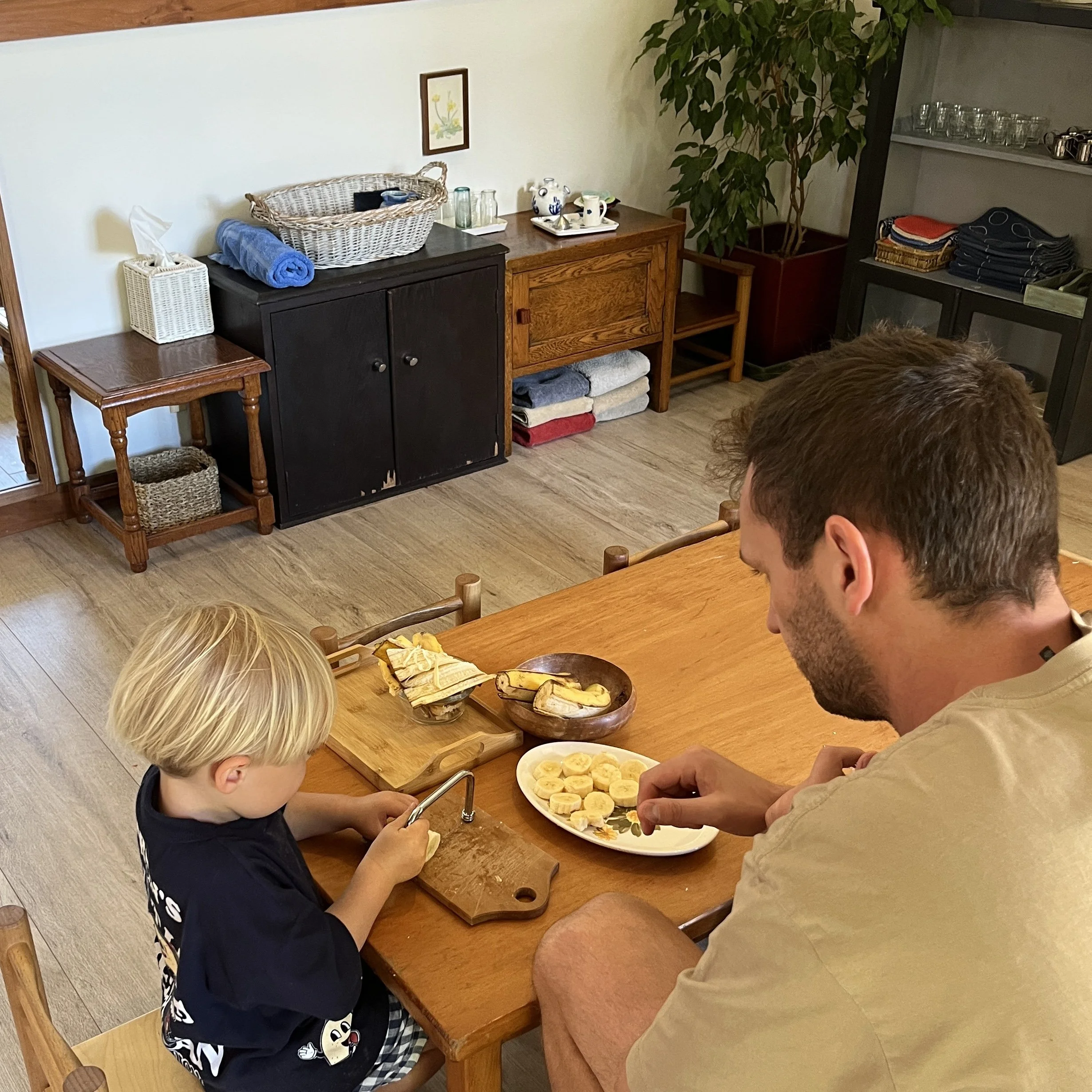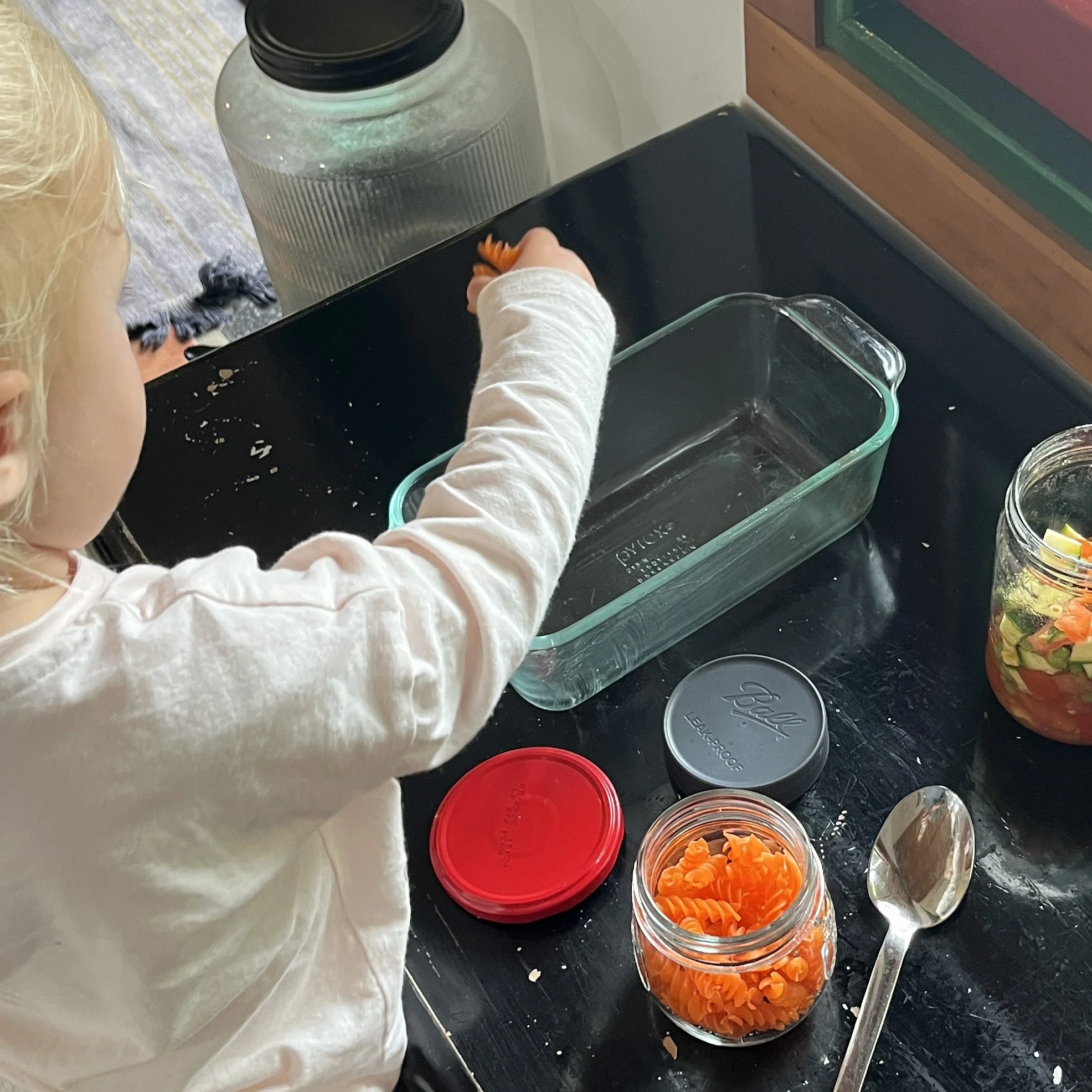Food Preparation as an Opportunity for Education
We can always elevate the experience of eating to one of fine dining. It is all about our attitude and making food preparation accessible to our children.
Pavarotti is said to have stated
“One of the very nicest things about life is the way we must regularly stop whatever it is we are doing and devote our attention to eating”.
The most important reason for food is, of course, for survival, however it is always our choice whether we merely eat or elevate the rituals surrounding “food” and dine. Socially, food becomes a measure of acceptance and sharing, when we invite a friend for dinner - we are saying “I will share my survival with you” and this is the level of community we aim to achieve in our 0-3 environments. It is necessary then for adults to understand how our attitude and behaviour towards food affects children, positively or negatively. We must give careful consideration to how we are going to model and prepare food with and for children.
In group childcare settings - beginning with infants, in the nido, we take great care to ensure breastfeeding is possible and that bottle feeding is respected and offered with the same level of care. Feeding is a time for building connection, relationship and trust that the world is a safe place to be - it must be protected from interruptions. As the child develops – purees and solid foods may be initially offered in the lap of the caregiver, and, once the child is able to sit independently, a weaning table ensures that the child continues to receive face to face, individual connection, where they can begin the process of learning to feed themselves in their own time, before joining the group meal.
By the time the child joins the Young Children’s Community, they have had lots of experience and practice with spoons, glasses, jugs, bowls and plates, and built a body of knowledge about their use – they are comfortable with the idea that this table is the place to eat. They understand that if they indicate they have finished their meal, by leaving the table, it will be packed away. Socially they have shown a desire to join the group, and possess the ability to meet some of the expectations of communal dining (if the child joining the community is coming from home, where the expectations may be a little different, we simply adjust our practice and ensure this child is sitting alongside an adult who is gently guiding).
We observe regularly that children will often try things they would not eat at home – either through preparing the food themselves or simply being inspired by the friends sitting alongside them.
“While it is necessary to give food to the child, still it must be an educative action.” Maria Montessori
Food preparation and related activities are foundational to the Toddler community – they are not merely classed as “practical life’ but span all aspects of the curriculum. Some examples of this include:
· Gross motor development and equilibrium are enhanced as we carry jugs of water for table scrubbing, move tables or chairs and set the table.
· Fine motor and hand to eye coordination develop through slicing fruit and vegetables for the meal.
· What better way to teach the skills to care for oneself than through making it possible to prepare a meal, washing hands beforehand and cleaning faces and brushing teeth afterwards.
· Similarly, to care for others and the environment now becomes possible in a very tangible way, we always acknowledge children’s contributions to the meal and they may assist in cleaning up afterwards.
· New vocabulary is introduced for naming and describing. Language continues developing as we chat while working and converse over the meal.
· Grace and courtesy naturally occurs as we model table manners, and it is here that we can truly elevate the experience to “dining” through additions such as lighting a candle to begin karakia, flowers adorning the table and using beautiful table settings.
· Culture is shared in natural ways through food, festivals and celebrations are fantastic opportunities to expand on the usual fare and involve whānau in our programme.
· Food is deeply sensorial with different flavours, scents and textures all adding to the richness of our lives – who among us is not in possession of some memory of childhood dish we loved.
In a full day community programme the day can begin with a breakfast of hot porridge and fruit offered to those who want it.
In our parent/toddler classes we have at least 6 food preparation trays to inspire families and build their confidence to cook with children at home - slicing hardboiled eggs, spreading hummus on crackers and slicing banana are staple experiences and we also offer seasonal food preparation which is often inspired by what is growing in the garden (which also means we go and harvest what we need - ensuring that vital link of garden to table). We also bake daily - bread and muffins.
Our goal is always to increase confidence - in the child, in the family, in the educators. Food preparation is often messy and thought of as too difficult to manage so we encourage you to embrace the mess and the “difficult-ness” and really spend some time exploring how you can offer these life affirming experiences to your children.
I remember back to the 1990’s when I was studying my initial teacher training (Dip ECE teaching) and cooking with children was an essential part of the curriculum - no-one would dream of leaving out process cooking in a kindergarten. Fast forward 30 years and now cooking with children in childcare is a rarity - saved for sporadic special occasions. During my time as a ECE educator I became annoyingly passionate (to my managers and coworkers) about how much of real life children are now missing out on - especially when they “live” in long day childcare settings. I believe in health and safety measures, they are important and I recognise the increase in group size often leaves educators “supervising” - children are no longer included in taking washing to the laundry, the kitchen is out of sight and food just arrives. Be the revolution - consider carefully how you can meet health and safety requirements to involve children in everyday living.
Many of our experiences have a level of pre-preparation so they become possible for involving children. We need to not be deterred or overwhelmed by thoughts of a toddler baking a cake from scratch. Think about the aspects they can be involved in and make that possible.
The food prepared is set aside for our community meal and children gain an understanding this is in service to the community (naturally there are impromptu snacks along the way). We eat as a community, and although children are not forced to join, we find nearly everyone makes their way to the table with enthusiasm.
Mealtimes are viewed as an opportunity for fuelling children’s emotional tanks as well as the physical body, they are unhurried times for connection and care.
Karakia - expressing gratitude before our meal
We can make food preparation successful with some thought. Finding child sized implements that work well are vital. Think about the order of the presentation – will it make sense to the child and is success possible? How will clean up happen? And where will children place their contributions to the group meal.
It’s a great topic for internal evaluation in your 0-3 programme – so I encourage you to get creative and examine whether your food preparation area is a thriving hub of activity.
Aroha Nui
Carli


